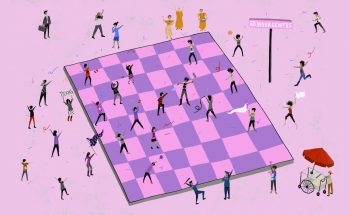
Translation – Hear Me, Earthlings
Share:
Translation by: Patrick Moseley
[Daniel Alarcón, host]: Welcome to Radio Ambulante from NPR. I’m Daniel Alarcón
A few years ago —almost five years now— I gave my son León a recorder. Nothing very advanced technologically speaking: more like a simple machine, with three buttons. It was made of cherry red plastic and small, the size of a tube of lipstick. I don’t remember what brand it was, but it fit comfortably in his hand.
León would have been around eight then. Radio Ambulante was a new thing in our house, I mean, I’m sure that’s where we got the idea. He saw us with our microphones and all that, and of course, he wanted to do the same.
And, well, for several weeks, he took that machine everywhere. Every day at school, it was always in his pocket, in his book bag.
Because he was a kid, he lost the enthusiasm for it. That always happens, with any toy. He started losing interest in it, and one day it went from his book bag to a drawer, and that’s where I found it, months later, forgotten and abandoned.
And it was then that, out of curiosity, I connected it to my computer to see what exactly my son had been recording for those weeks he was obsessed with the little gadget.
(SOUNDBITE OF CHILDREN PLAYING)
[Daniel]: A lot of sounds from recess.
A little tra-la-la.
(SOUNDBITE OF LEÓN SINGING)
[Daniel]: I found a few journalistic exercises. Like this interview with a teacher where León and his accomplices go straight for the jugular.
[Child 1]: OK, I’m going to start recording you.
[Child 2]: Who is your favorite kid? Who is your favorite kid!
[Daniel]: “Who is your favorite kid?”, they ask him. “Who!”
He didn’t just interview teachers, but also his classmates.
[León Armeni]: Hello, this is León Armeni, and this… this is my friend Donovan.
[Daniel]: Here he asks a friend to detail all the times he’s been in accidents.
[Donovan]: Hello. Today we are going to be talking about some of recent and not so recent injuries. Back to you.
[Daniel]: Then come two minutes of descriptions of skinned knees, collisions, bug bites, falls, fractures, contusions, cuts, and so on.
[Donovan]: And I banged the side of my head on the bar of a tennis thing.
[León]: Tennis?
[Donovan]: Yeah. And then, it was gushing blood. After that, another one…
All of this —you probably already noticed— is in English. Obviously.
Until he was four or five, León only spoke Spanish. But we lived in California, and when he started school, he quickly switched to English, like so many immigrant children in the United States. The same thing happened to me.
I loved going through these recordings, artifacts of a moment, knowing how children talk and what they talk about when adults aren’t around, watching them.
Ok, but I want to mention another detail. Our youngest son was less than a year old at the time, and he also appears on these recordings. We wanted León to keep practicing his Spanish and so to motivate him, we told him that Eliseo —his brother— didn’t understand English. Just Spanish. Exclusively.
At less than a year —English, Spanish, French, Greek— I mean, understand, understand, well, no. But even though what we told León wasn’t exactly true, it was well-intentioned: we didn’t want him to lose his native language.
So that detail is important to understand this recording that I found on the recorder, in which León interviews Eliseo.
[León]: This is Eli. He’s going to say something. What’s your favorite color? Favorite?
[Eliseo]: Uh.
[León]: Orange?
[Eliseo]: Ya.
[León]: Do you like cars?
[Eliseo]: Ya.
[León]: Yes. Do you really like cars?
[Eliseo]: Ya.
[León]: They’re very cool, aren’t they? What is your favorite car? Favorite. This one or the arrow max? The arrow max? Oh, the Dodge? Or do you like this one more? Which one do you like?
[Eliseo]: This.
[León]: Oh, this one? You like this one? Ah, he likes the car that’s really off-road, and he’s going… from to the car.
[Eliseo]: Papa. Papa.
[León]: Do you like the…?
[Eliseo]: Papa.
[León]: Where’s dad?
[Eliseo]: Ya.
[León]: He’s in the house!
[Daniel]: I love this recording. As a father, I’m fascinated that our rule —that you have to speak to Eliseo in Spanish— worked, my older son followed the rule, even when it was clearly easier to speak English. I love that Eliseo —monosyllabically— answers León. He’s convinced that his nine-month-old little brother is communicating a preference between two brands of car. I like the word “favorite,” favorite in English. I like that León corrects himself.
I grew up in the United States, in a Peruvian household, and my parents were very disciplined when it came to language. At home, we spoke Spanish. Period. Among my siblings and I —and our cousins who grew up with us, of course— that whole generation: English only. It was the language that was around us.
My Spanish was simple. What I needed to ask for more rice at dinner or ask permission to leave the table. It wasn’t a particularly sophisticated Spanish, and it didn’t have to be either. Every time I traveled to Lima to visit my cousins, they made fun of me, of my accent and my missing vocabulary. But then, after two weeks, my Spanish was reborn in me, and by the end of the vacation, I was speaking well.
It never lasted.
From ‘89 to ‘95, I didn’t go to Peru. My parents did, but we —the kids— didn’t, because of the situation, because it wasn’t considered safe. It was the height of the terrorist years. For seven years I barely saw my cousins at all, or my aunts and uncles, I didn’t have much of a chance to reconnect with the language. Besides, I was a teenager, and I spent less time at home and more with my gringo friends. I almost never spoke Spanish.
My vocabulary started to disappear. My grammar, always intuitive, atrophied from disuse.
It’s not hard to identify my lowest point: it was 1999. I lived in New York, in an apartment I shared with a bunch of friends, and my cousin and her boyfriend came to visit. I remember we had to set them up in the living room, on a futon. They brought me a gift. I don’t remember what it was, but I’ll never forget what I told them when I accepted the gift.
I wanted to say: “Thank you so much! You shouldn’t have!”
I said, “I thank you very much! Even though I don’t have to!”
They looked at me perplexed, and I blushed. I knew I had said something wrong, but I didn’t really know how to fix it, because I didn’t have the words.
I’m not the only one. Being good at speaking Spanish is complicated. Since that moment, I decided I had to get studying, but seriously, not to experience another shame like that one.
When we get back from the break: learning to speak Spanish well isn’t just for Latinos in the United States, of course. For a lot of people in Latin America, perfecting the language determines their economic future and their status.
[Ad]: This message comes from NPR sponsor, Squarespace. Squarespace is the all-in-one platform to build an online presence and run your business. Create your company’s website using customizable layouts, along with features including e-commerce functionality and mobile editing. And Squarespace offers built-in search engine optimization. Go to Squarespace.com/NPR for a free trial, and when you’re ready to launch, use the offer code NPR to save 10% off your first purchase of a website or domain.
[Hidden Brain]: Why does wearing red shoes make you seem more influential? What happens to the relationship with your neighbors when you live near a park? Is it possible to use a dog training method for dogs… to train doctors? The answers to these and other questions in Hidden Brain, an NPR podcast.
[Latino USA]: Hi, I’m Maria Hinojosa host of the NPR show Latino USA. What do you think? There’s almost 60 million Latinos and Latinas in the US. We document those stories and those experiences each week. Find us on the NPR One app or wherever you get your podcast.
[Daniel]: We’re back with Radio Ambulante. I’m Daniel Alarcón
I already told you the lowest point in my relationship with Spanish was in 1999. Well, I decided I had to do something about it. I went to Lima and I soon realized several things: first, the slang I spoke was my dad’s, that is, from the ‘60s, from Arequipa, a city in the south of Peru. In other words, O spoke like an old man. I learned, for example, that not everyone knew the words that were normally used in my house: arreconchumate, entendiquichu, etc.
And second, I had absolutely no command of formal Spanish. At all. It had never been a problem because in Peru we don’t use “Usted”, the formal you, to talk to family. But in Lima, I was trying to do a little journalism, investigating a somewhat delicate topic, so I had to speak with politicians and professors and academics, serious people. People who saw me —with a baby face— and then heard me talk like an old man, and, well, they looked at me funny. I had the constant feeling of looking foolish. It was a feeling of powerlessness, of not having the necessary tools to show that I wasn’t an imbecile.
But I didn’t give up, out of sheer stubbornness. I swallowed my pride and kept going. I moved to the suburbs of Lima, where I lived for a little over a year. I read a lot. I listened to RPP, the most important national broadcast. I played soccer with my cousins, and on the field, I could update my vocabulary when it came to insults. I learned to master the multiple uses and variations of the word “huevo,” which is essential for a Peruvian. And, well, by the end of that year, I spoke like any other Limeño. And I was very proud.
But that idea of “speaking well” never stopped being a worry of mine. Perhaps that is why a few years later —in a sad neighborhood in Lima near the central market— a little book printed on newspaper stock caught my attention. It was called Discursos y brindis, Speeches and Toasts. Key tips for public speaking, the cover read. Speeches for any occasion.
The cover was pure optimism: bright and colorful, with images of winners. A recent graduate with a diploma in hand, a pair of newlyweds with glasses ready to toast, a man in a blue suit and a red tie in front of a microphone with a mischievous smile, as if he just told a dirty joke.
It seemed so strange to me —at first glance— that I bought it. And years later, it’s still one of my favorite books. I mean, who isn’t afraid of public speaking?
The introduction has blurry pictures of history’s great orators: a picture of a bust of Socrates, a photo of Martin Luther King, another of Vice-president Al Gore.
And it had rather specific tips. For example:
[Man]: “Practice your voice, pauses, glances, movements, hand placement, and facial expressions.”
[Daniel]: I’m quoting the book, in case that’s not clear.
It’s not bad advice: avoid drinking too much coffee before a speech, don’t abuse alcohol or tranquilizers. Yeah, rather practical. Always carry a handkerchief, in case you sneeze or cry. OK. Don’t speak too fast —something they always tell me here at Radio Ambulante.
And this, which seems key to me, is something that we keep in mind here when we edit our scripts:
[Woman]: “The goal of the speech is to win the audience over with ideas, not try to amaze them with our mastery of the language. One must flee from obscure language or complicated sentences.”
[Daniel]: Oof. Yes. 100% agree. But, beyond the introduction, what about the speeches? Let’s see, how about this one: “Speech for the End of a Political Career.”
[Man]: “I’m not trying to win votes. Rather, I’m going to give my vote of gratitude. Today, well, I am leaving behind the hustle and bustle of politics, but I am taking with me the memories of a professional career that has always posed continual challenges and has been a great source of stimulation at the same time. Politics is already part of my past. Now what I’m interested in is the future. After all, that is where I’ll spend the rest of my life.”
[Daniel]: This is the “Speech in Honor of a Mother’s Name Day”
[Woman]: “Dear mother, please accept the affection and sincere well-wishing of your children, your grandchildren, and all the relatives who see in you a selfless mother who knew how to persevere against all obstacles.”
[Daniel]: This one is good: “Speech from a Child Honoring Educational Authorities.”
[Man]: “It is an honor to this town and an inspiration to its children that you should visit us, you figures of learning who work for the intellectual aggrandizement of the province, in whose jurisdictions resides this town, which has its hopes placed in you, because in your hands is entrusted the sacred mission of teaching. Long live education! Long live the country!”
[Daniel]: Also, there’s this one: “Speech from an Orphan on Father’s Day.”
[Man]: “Father’s Day is the most glorious of all holidays. It is a day without equal in all the calendars in the world, for being dedicated to him, because a father is the person who intervened in the childhood of all the great geniuses who have transformed the world, all the triumphs recorded in history. Since I no longer have the privilege of being able to place my lips on the brow of the man who gave me wings, I desire instead to take a moment of silence, in homage to all the fathers who lie in eternal rest. Please join me, all, in lowering our heads.”
[Daniel]: I love how baroque every sentence is. I like the grammatical high- wire, the grandiosity of every emotion. It’s all very moving, because I’ve heard speeches like these. Some of them have been given by members of my own family. The cover of the book maybe doesn’t show it, but this book is very Latin American. In other words, I can’t imagine using a speech like this in the United States.
[Woman]: “Eulogy for a Departed Fisherman.”
“We won’t find Juan sitting on the riverbank anymore. We won’t hear him telling his big fish stories. He won’t cast his line again. And even though his fishing net is empty today, our eyes… are full of tears.”
[Daniel]: But this is perhaps one of the most useful: “Words from a Member of an Institution at the Opening of a Radio Receiver.”
[Man]: “In parallel with the passage of time, emerge the inventions and also the needs of humankind. In style befitting the modern era, this receiving device comes into place, installed in the rooms of this club, in which not only members of the institution will capture and collect information about the word, but so too will the entire town participate in the news, brought directly to our ears on ethereal waves, of all the happenings that take place on the varied and rugged surfaces of the globe which shelter us minuscule earthly humans.”
[Daniel]: I used this exact speech when we bought a new microphone for the studio here at Radio Ambulante.
There are dozens of speeches inaugurating things. But the most obscure things: a school library, a soccer tournament, an equestrian competition, even a communal farm.
There’s a rather generic, but ultimately moving speech that celebrates the purchase of a “recreational object.” Which is perfect for me because my son just asked for a recreational object for his birthday.
There’s a “Peroration of a Young Man Thanking a Gentleman Benefactor.” Or a “Speech in a Theatre to Introduce an Acting Troupe.” The author of the book —which is anonymous, of course— thought of everything, because they also include: “Response to a Speech in a Theatre to Introduce an Acting Troupe.” And so on and so on.
Every once in a while, when I’m feeling nostalgic, I open this book and feel like I’m at home. It isn’t poetry, not exactly. But you can’t say it’s not poetry, either. Right?
The more I think about these speeches, the more I realize it’s much more than a little self-help book this is. Look, Peru is a country defined and divided by language. There are 15 different language families. The most spoken indigenous language, Quechua, is the native language of five million Peruvians. In facts, it’s been an official language since 1969. But in real life, that doesn’t mean a lot.
In Peru, there’s only one language that matters, a language that means progress and possibility and access and money: Spanish. In Peru, the way you speak matters almost as much as your appearance.
And really, that’s what this book is about. It’s about a cultural, linguistic, and ethnic division between the Andean and Criollo world, between the mountains and the coast, between the poor and the rich. For a lot of Peruvians —especially for those of indigenous ancestry— having command of formal Spanish means the possibility to progress. And that is what everyone wants, right?
So you have a book like this one.
It’s not a fun little artifact. It’s an attempt to cure a national wound. There’s no speech about this, of course.
There’s no: “Calming Speech about the Bifurcated Identity of a Country Fractured by Its Own Complicated and Unsettling History.”
There’s no: “Tribute to the Possibility of Creating a Nation of Culturally Disparate, Occasionally Conflicting, Tribes that Constitutes, For Now, and Imaginary Country.”
There’s no: “Quixotic Homage Trying to Hide 200 Years of Intrinsic Shortcomings in this National Project.”
None of those speeches are in this magic little book. I know. Because I checked.
[León Armeni]: This episode was produced by Daniel Alarcón and edited by Camila Segura. The mixing and sound design are by Andrés Azpiri. The friends who read speeches are: Benny Chueca, Eduardo García Peña, José Gallegos, Elsa Macpherson y Natalie Macpherson.
Thanks to Doug McGray, who edited the first version of this essay for PopUp Magazine. Thanks to Sabrina Duque for her translation.
The rest of the Radio Ambulante team includes Lisette Arévalo, Gabriela Brenes, Jorge Caraballo, Victoria Estrada, Andrea López Cruzado, Miranda Mazariegos, Diana Morales, Patrick Moseley, Ana Prieto, Laura Rojas Aponte, Barbara Sawhill, David Trujillo, Elsa Liliana Ulloa, Luis Fernando Vargas, Silvia Viñas, and Joseph Zárate. Carolina Guerrero is my mom and the CEO.
Radio Ambulante is produced and mixed on Hindenburg PRO.
Radio Ambulante tells the stories of Latin America and the United States. From New York, I’m León Armeni. Thanks for listening.






